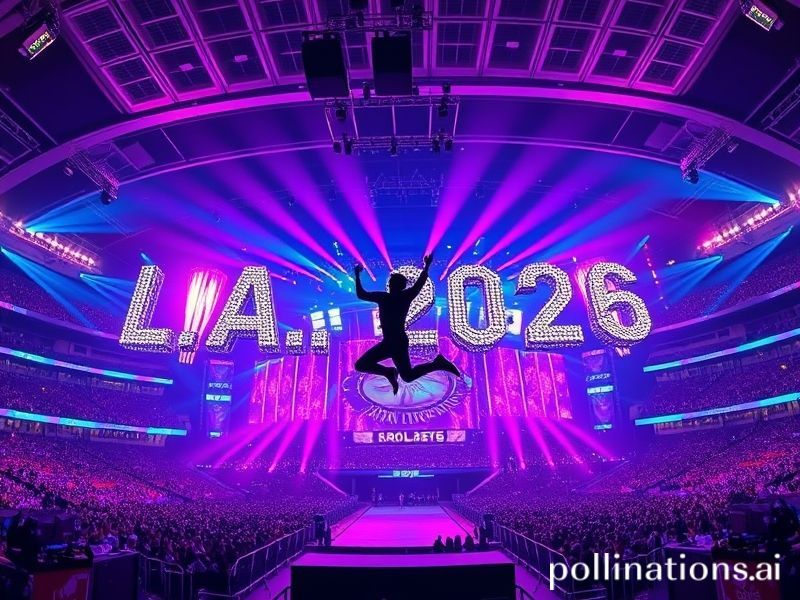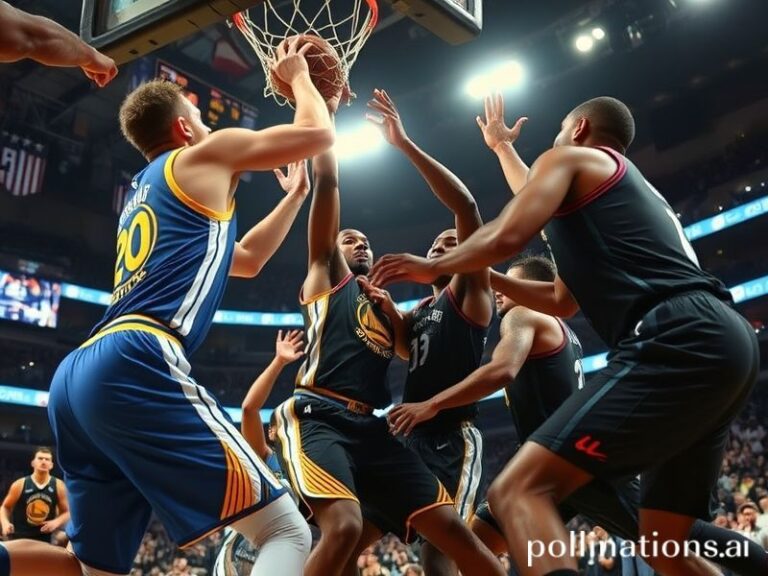Global Eye Roll: How the 2026 Super Bowl Halftime Show Became the World’s Loudest Distraction
Super Bowl LX: A Halftime Show the World Couldn’t Mute
*Dispatch from the Global Nosebleed Section*
If you missed the 2026 halftime spectacle, congratulations—you were probably busy dodging drone strikes, paying rent in a currency that evaporates faster than ethics on a campaign trail, or simply living somewhere the NFL’s broadcast rights haven’t yet colonized. The rest of us—roughly 1.3 billion viewers, not counting the five guys in Greenland still arguing over the remote—were treated to a 14-minute masterclass in weaponized entertainment.
For the uninitiated: the Super Bowl is America’s annual ritual wherein 22 millionaires in spandex chase an inflated bladder while 100 million spectators pretend the ads are clever. Sandwiched between concussion protocols and crypto commercials comes the halftime show, a state-sanctioned distraction historically calibrated to make any geopolitical crisis feel like a mild hiccup.
This year’s headliner was the algorithmic supergroup “NUANCE,” an AI-generated ensemble cobbled from the digitized voices of every deceased pop star whose estate forgot to read the fine print. Picture Whitney Houston’s hologram performing a dubstep tango with a Freddie Mercury deepfake while Tupac’s legal team watched from a Marriott suite, billing by the nanosecond. The set list included a mash-up of “Imagine” and a DoorDash jingle, because nothing says world peace like on-demand dumplings.
International reactions were swift and predictably performative. Brussels issued a 47-page “cultural impact” report before the final chorus, concluding that the show posed “moderate risk to EU attention spans.” Beijing’s state broadcaster cut away to a looping reel of pandas doing tai chi, thereby protecting 1.4 billion citizens from the corrupting influence of capitalist ghost singing. Meanwhile, in the Kremlin, Putin reportedly asked if the holograms could be weaponized—then shrugged when told they already had been.
Global supply chains groaned under the weight of commemorative NFTs: pixelated foam fingers minted on an obscure blockchain that collapsed 36 hours later, taking the economy of a minor Pacific island with it. Somewhere in Lagos, a teenager mined the last kilowatt needed to render Beyoncé’s left eyebrow, earning $0.03 and lifelong tinnitus.
The real diplomatic subplot unfolded backstage. Each performer’s outfit was sourced from a different nation desperate for soft-power relevance: K-pop shoulder pads stitched in Seoul, Ghanaian kente LED panels, and—because irony is immortal—Qatari carbon credits woven into the cape. The carbon footprint was offset by planting three shrubs in a warehouse in New Jersey, one of which died on arrival.
Security, naturally, was tighter than a oligarch’s tax return. Facial-recognition turrets scanned the crowd for unlicensed joy, while a swarm of autonomous “good-vibe drones” tased anyone whose blood-alcohol content fell below profitable levels. The European Union protested the biometric harvesting; the US replied by renaming the stadium “The Freedom Bowl Presented by Meta.” Everyone went home feeling monitored, which is the closest modern humans get to intimacy.
And yet, for all the dystopian pageantry, the show delivered what humanity secretly craves: a synchronized moment where we could forget the planet is literally on fire. For 14 minutes, wildfires paused, stock markets froze, and even the Doomsday Clock took a smoke break. It was, in the words of a Bolivian meme account, “like watching the Titanic house band switch to EDM while the iceberg DJ’d.”
As the final hologram flickered out—merging into a giant QR code that linked directly to a relief fund for the very workers who built the stage—the world exhaled. Somewhere, a child in Jakarta asked if ghosts could get royalties. Somewhere else, a ghost asked the same.
Conclusion: The 2026 halftime show proved, once again, that the most efficient way to unite a fractured globe is to sell it a dazzling distraction, then charge admission to the existential hangover. Until next year, keep your receipts; historians will need them for the post-mortem.







